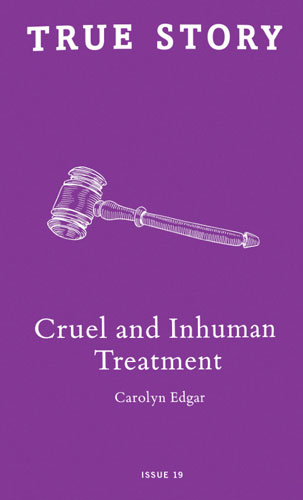True Story – 2018
Each issue of True Story shines a spotlight on one nonfiction piece by one writer. As one of my favorite print magazines, I always look forward to finding out which each new issue’s story will be. This year’s issues have, among other stories, featured a neighborhood coming together to search for a missing woman with dementia (“Search Party” by Stewart Lawrence Sinclair), and a camp counselor reflecting on his treatment of a particular camper in the wake of a sex abuse scandal involving the camp where he was once a camper himself (“Unmolested” by Michael Lowenthal). Readers never really know what to expect with each issue, part of the beauty of the little, pocket-sized magazine.
Each issue of True Story shines a spotlight on one nonfiction piece by one writer. As one of my favorite print magazines, I always look forward to finding out which each new issue’s story will be. This year’s issues have, among other stories, featured a neighborhood coming together to search for a missing woman with dementia (“Search Party” by Stewart Lawrence Sinclair), and a camp counselor reflecting on his treatment of a particular camper in the wake of a sex abuse scandal involving the camp where he was once a camper himself (“Unmolested” by Michael Lowenthal). Readers never really know what to expect with each issue, part of the beauty of the little, pocket-sized magazine.
The latest issue features “Cruel and Inhuman Treatment” by Carolyn Edgar. Part homage to the art of nonfiction, part examination of Edgar’s relationship, part tribute to Edgar’s mother, this issue delivers strong, masterful prose as usual.
Edgar begins:
There is a dent in a wall of my parents’ house that is the exact size and shape of Mama’s head.
I rarely say, “My father beat Mama.” I say, “My parents fought,” because that is how Mama described it. They fought. Her word became my word. Her way of describing her experience became mine.
This not only introduces her parents’ relationship, but also demonstrates Edgar’s mother’s strength and resolve. Mama, who does not see herself as a victim, fights back and makes the hard decision to stay with the man who hurt her so that her six children have a comfortable life. Mama, a take-no-shit woman, who gives it right back if she is forced to take it, helps others as well as herself. She helps a friend move from an abusive relationship, threatening the man with a pot of boiling oil, using the tools at her disposal to never stop fighting. She warns her daughters never to show fear, to never be dependent on a man. Edgar paints such a vivid image of Mama, it’s almost as if we’ve met her.
Armed with her mother’s strength and her knowledge of law after graduating from Harvard, Edgar resolves she will live differently than her mother did. She will be safe from her mother’s experience. She will listen to the warning not to marry a man like her father. But, in a section that really touched me, she wonders: “what did that mean? There were a lot of things I liked about my father. He wasn’t a gentle man—he was taciturn and gruff—but he never treated me the way he treated Mama.” Listing his good qualities, she gracefully asks, “Why wouldn’t I want a man like that?” Despite learning how to separate these people—her father from her mom’s abusive husband—the man she marries ends up looking like her father. He ends up being like her father.
Edgar goes on to tell readers of the abuse she experienced at the hands of her ex-husband Jim, but the real focus remains on Mama and the way nonfiction allowed Edgar comfort and freedom.
After their attorneys let them go as clients due to monetary issues, Jim and Edgar are left to defend themselves in court. It’s at this point that Edgar realizes the more times she tells her story, the more strength she has: “[W]ith each retelling, I began to understand and embrace the power of owning and controlling my own narrative.” As she reckons with this, she realizes that maybe she doesn’t need to address her abuse the same way her mom did: “Denying that I was abused kept me trapped. Once I realized I was not choosing between strength and weakness, but momentary humiliation and freedom, the choice was easy.”
Edgar illuminates the importance of taking control over and telling your own story. It wasn’t her mother’s advice or a threat of a pot of boiling oil that helped her move on from her abuse. It was being able to voice what was done to her that allowed her to begin moving on. Whether it’s writing an essay about our experiences, or it’s telling a friend over drinks, we are able to take more control when we say our side of the story.
True Story is a little magazine that always packs a punch. The journal is perfect for readers who have already cultivated an appreciation for the craft of creative nonfiction, and it is also a great introduction for the uninitiated.
[www.creativenonfiction.org/true-story]





